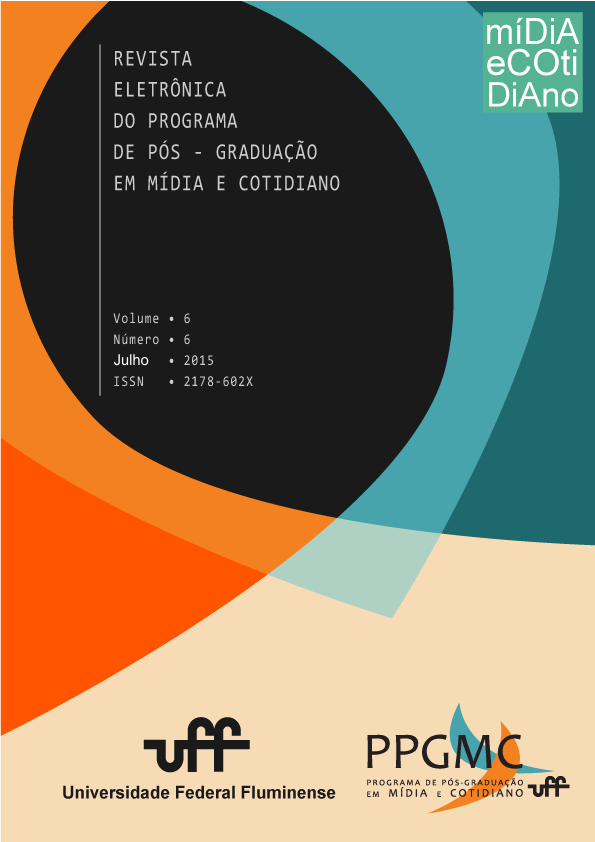IMEDIAPOLIS: CIDADE, TECNOLOGIA E POLÍTICA
DOI:
https://doi.org/10.22409/ppgmc.v6i6.9737Abstract
Na Parte I o artigo busca as diferentes definições que têm sido associadas ao termo mediapolis, procurando relacioná-las aos conceitos de cidade, tecnologia e política. A pesquisa registrou o uso do termo mediapolis no contexto teórico da arquitetura, das comunicações, da sociologia e da política, bem como no da filosofia. Na Parte II o artigo apresenta os agentes sociáveis artificiais, mídias autônomas, inteligentes e capazes de interação/cooperação com seres humanos. Esses novos atores sociais subvertem os conceitos de cidade e de cidadão, sugerindo a evolução da Mediapolis para iMediapolis – intelligent media polis (cidade de mídias inteligentes). Conclui-se com a necessidade de rever as contribuições de Silverstone e demais autores sob a luz dos atores sociais artificiais.
Downloads
References
Breazeal, Cynthia; Scassellati, Brian (1999) How to Build Robots that Make Friends and Influence People. In: IROS99. Kyonjiu, Korea.
Business Times. (2009) Creative Buzz at Mediapolis. March. Acesso em 10 de Julho de 2014: https://1north.wordpress.com/2009/04/06/creative-buzz-at-mediapolis/
Burd, Gene. (1982) Urban Uses and Social Impact of New Communication Technology: a critical and philisophical perspective. Qualitative Studies Division, University of Texas, July.
Christofidou, Eirini. (2012) Mediapolis – The convergence of the physical and digital spaces in the urban realm and locative media technologies, Master Dissertation, University of Sheffield.
Cogo, Denise; ElHajji, Mohammed; Huertas, Amparo (eds.) (2012) Diaspora, migration, communication technologies and transnational identities. Bellaterra, Institut de la Comunicació, Universitat Autònoma de Barcelona.
Coutinho, C.P.; Junior, J.B.B. (2007) Blog e Wiki: os futuros professores e as ferramentas da Web 2.0. In: SIIE.
Dalghren, Peter. (2013) Cosmopolitanism and Global Citizenship: the Rhetoric of Moral Agency. University of Copenhagen, Jan. 15-18.
Darling, Kate. (2012) Extending Legal Rights to Social Robots. In: We Robot Conference, April, University of Miami, Miami, USA.
Design Incubation Centre (2008) Robots 2.0 Workshop. Disponível: http://www.designincubationcentre.com/index/past-workshops/robots-20/index.html
Fogg, Brian J. (1998) Persuasive Computers: Perspectives and research directions. In: Proceedings of the CH198. Conference of the ACM/SIGCHI. New York: ACM Press.
Guerini, Marco et alli (2003) Persuasion Models for Intelligent Interfaces. In: Proceedings of the IJCAI Workshop on Computational Models of Natural Argument. Acapulco, Mexico.
Imbres, Peter (2007) Web 3.0: Attack of the Conversation Robots. Disponível: http://point-oh.com/?p=119
Inkinen, Sam. (2004) On the Electronic Zeitgeist. Aspects of the Information Society, Homo Symbolicus and the Global Village. European Institute for a Sustainable Information Society (EISIS), Helsinki, Finland.
Jong, Alex de; Schuilenburg, Marc. (2006) Mediapolis – popular culture and the city. Rotterdam: 010 Publishers, 2006.
Lipson, Hod (2007) Evolutionary Robotics: Emergence of Communication. In: Current Biology. Vol. 17, No 9.
Mehler, Alexandre et alii (2008) Handbook of Technical Communication. Berlin/New York, Mouton de Gruyter. Disponível: http://valian.kgf.uni-frankfurt.de/hal8/hal8.pdf
Nardi, Dario (2002) Intelligence as Communication-Roles and Needs of Socially Embedded Agents. In: Proceedings of the Lake Arrowhead Conference on Computational Social Science and Social Complexity.
Reddy, T. R.; Paul, S.; Jyothi, B. V. (2013) The Rise of The Cyborgian Epoch. In: International Journal of Computer and Information Technology, 2(2).
Rodgers, Scott; Barnett, Clive; Cochrane, Allan. (2008) Mediapolis – an introduction. In: Mediapolis - media practices and the political spaces of cities. Interdisciplinary workshop. The Open University, Milton Keynes, UK, 9-10 June, pp. 3-10.
Seligmann, Ari. (2013a) Artpolis Legacies Proliferation of Public Architecture Programs for Urban Regeneration in Turn of the Century Japan. In: Brown, Alexandra; Leach, Andrew (ed.). 30th Annual Conference of the Society of Architectural Historians, Australia and New Zealand. Gold Coast, Queensland, Australia, July 2-5, pp. 83-95.
Seligmann, Ari. (2013b) Revitalizing Cities: Architecture as Regional Catalyst from Bubble Era Blowouts to Fukushima Fallouts and Beyond. Japanese Studies Association of Australia, Conference, Japan Institute, ANU College of Asia & the Pacific, The Australian National University, Canberra, Australia.
Silva, Crystian K.P. (2007) Web 2.0: a migração para a Web Social. Ciência da Computação, UFJF.
Silverstone, Roger. (2006) Media and Morality: On the Rise of the Mediapolis. London School of Economics and Political Science, London, UK.
Spivack, Nova (2006) The Third-Generation Web is Coming. Conceito disponível: http://www.kurzweilai.net/meme/frame.html?main=/articles/art0689.html
Tufte, Thomas. (2011) Mediapolis, Human (In)Security and Citizenship. Communication and Glocal Development Challenges in the Digital Era. In: Christensen, Miyase; Jansson, Andre; Christensen, Christian (ed.). Online Territories: Globalization, Mediated Practice and Social Space. New York: Peter Lang, pp. 113-131.
Waal, Martijn de; Lange, Michiel de. (2010) The Mobile City: a conference on locative media, urban culture and identity. Netherlands Architecture Institute, Rotterdam, February 27¬-28.
Zhao, Shanyang (2006) Humanoid Social Robots as a Medium of Communication. In: New Media & Society, Vol. 8, No. 3, SAGE.
Downloads
Published
How to Cite
Issue
Section
License
Aviso de Direito Autoral Creative Commons
1. Política para Periódicos de Acesso Livre
Autores que publicam nesta revista concordam com os seguintes termos:- Autores mantém os direitos autorais e concedem à revista o direito de primeira publicação, com o trabalho simultaneamente licenciado sob a Licença Creative Commons Attribution que permite o compartilhamento do trabalho com reconhecimento da autoria e publicação inicial nesta revista.
- Autores têm autorização para assumir contratos adicionais separadamente, para distribuição não-exclusiva da versão do trabalho publicada nesta revista (ex.: publicar em repositório institucional ou como capítulo de livro), com reconhecimento de autoria e publicação inicial nesta revista.
- Autores têm permissão e são estimulados a publicar e distribuir seu trabalho online (ex.: em repositórios institucionais ou na sua página pessoal) a qualquer ponto antes ou durante o processo editorial, já que isso pode gerar alterações produtivas, bem como aumentar o impacto e a citação do trabalho publicado (Veja O Efeito do Acesso Livre).


